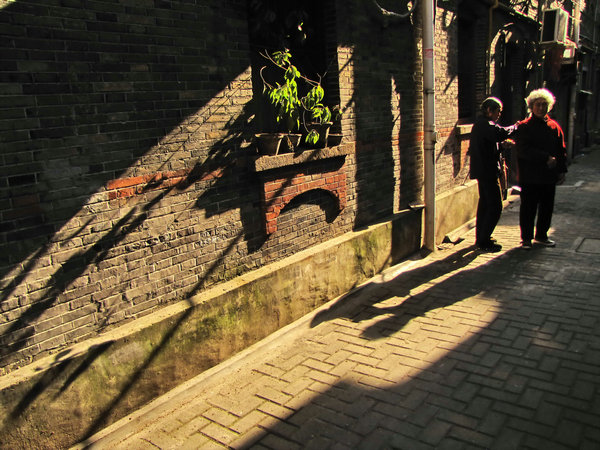Cocktail of past and present
Updated: 2015-06-06 08:06
By Satarupa Bhattacharjya In Shanghai(China Daily)
|
|||||||||||
 |
|
Elderly residents in a shikumenstyle alleyway in Shanghai. [Photo Provided To China Daily] |
Residents reflect on elements of their city, where local traditions and globalization collide
It is a Sunday afternoon in May, and I am inside a Fudan University classroom, where more than a dozen people - mostly young students - have come to attend a voice-training workshop for the Kunqu Opera. The theater form, less common in modern Shanghai, has its roots in southern China on the banks of the Yangtze River.
This 14-year-old program is held weekly during semesters at Fudan and witnesses the participation of an average 20 to 30 students. The current teacher is Zhao Wei, an architect by profession, who appears to enjoy spending his weekends on making youngsters learn proper phonation for onstage activities.
In Shanghai, China's most globalized city, some residents are fighting to keep local traditions alive.
As the middle-aged Zhao explains a scene from the well-known Chinese operatic piece, The Peony Pavilion, he sings in a range of high-pitched voices. The students, with their scripts in hand, listen carefully. The late Kunqu Opera veteran and radio presenter, Liu Xuantu, had taught Zhao the art years ago.
The workshop is a way to raise awareness about Kunqu, according to Hu Jiaji, a doctoral candidate at the university. Hu makes a distinction between this protected heritage and the relatively more famous Peking Opera from North China, by saying Kunqu didn't come up as a commercial art, but rather as a hobby for its practitioners.
Related Stories
Shanghai index hits 7-year high 2015-06-06 08:08
Shanghai to host stainless steel expo 2015-06-05 16:35
Yuan to be freely convertible soon in Shanghai FTZ 2015-06-05 07:07
Salvador Dali art show to open in Shanghai 2015-06-05 14:30
Derek Yee's movie to open Shanghai Film Festival 2015-06-05 15:14
Today's Top News
Rescuers right ship to speed up recovery
VW says China OKs bigger stake in venture with FAW
60% of Chinese youth OK with premarital sex: survey
Guangzhou Evergrande appoints Scolari to replace Cannavaro
65 bodies found, more than 370 still missing
Ex-FIFA executive detailed bribes in 2013 secret guilty plea
Beijing 'shocked' at Nazi comparison by Philippines
Ship disaster in Yangtze River: Roundup of updates
Hot Topics
Lunar probe , China growth forecasts, Emission rules get tougher, China seen through 'colored lens', International board,
Editor's Picks

|

|

|

|

|

|






